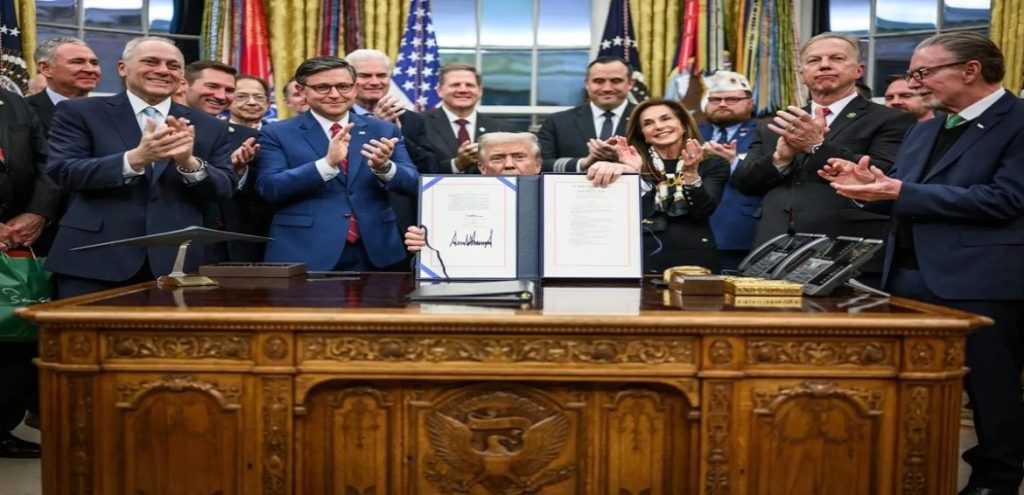President Donald Trump signed a federal government funding bill, officially ending the longest government shutdown in U.S. history, which lasted 43 days and disrupted several sectors of the American economy while paralyzing air traffic operations.
Before signing the bill, Trump declared—amid applause from gathered Republican lawmakers in the Oval Office—“Today we send a clear message that we will never surrender to blackmail,” urging Americans to “remember what the Democrats did” in the upcoming midterm elections.
The legislation provides government funding through January 30, including the resumption of food aid, payment of salaries to hundreds of thousands of federal employees, and the reoperation of the national air traffic control system.
Trump Signs Bill After Congress Approval, Ending Six-Week Government Stalemate
According to CNN, Trump’s signature followed Congress’s approval of the bill—passed in the Senate two days earlier by a 60–40 vote, and in the House of Representatives yesterday by a narrow margin of 222–219—thus ending a six-week stalemate over the future of Obamacare, opposed by Republicans, and paving the way for the reopening of federal agencies.
Upon returning to Washington for the first time since mid-September, nearly all Republicans, alongside several Democrats, voted in favor of the bill, which sets up another round of funding negotiations in Congress on January 30.
However, certain vital programs affected by the shutdown will now be protected from future political disputes, as the bill provides extended funding for a few key federal agencies until the end of fiscal year 2026.
After the bill’s signing, about 670,000 furloughed federal employees are set to return to work, while an equivalent number—who worked without pay, including more than 60,000 air traffic controllers and airport security personnel—will receive their delayed wages.
Democratic Split Helps Pass Funding Bill as Trump Declares Victory After Shutdown
House Majority Leader Mike Johnson said the funding package vote would take place that evening, urging bipartisan cooperation to “do the right thing” and end a crisis that cost the U.S. economy billions of dollars and sparked widespread debate about federal fiscal management.
Earlier this week, eight Democratic senators broke ranks with their leadership, enabling the passage of the temporary funding bill. This move exposed internal divisions among Democrats, with many arguing that the party should have held firm on extending federal health insurance subsidies set to expire at year’s end.
House Minority Leader Hakeem Jeffries announced that Democrats would introduce separate legislation to extend those subsidies for three more years, accusing Republicans and Trump of “ignoring the worsening cost-of-living crisis.”
These developments came just days after Democrats won key local elections in New Jersey, Virginia, and New York, signaling public frustration with Republican economic policies. Still, Trump retained his influence within the party, proclaiming during a Veterans Day speech that “the country is reopening—and it should never have been closed.”
The 43-day shutdown deprived nearly one million federal employees of paychecks, disrupted food aid programs for low-income citizens, and caused airport chaos due to the shortage of air traffic controllers.

